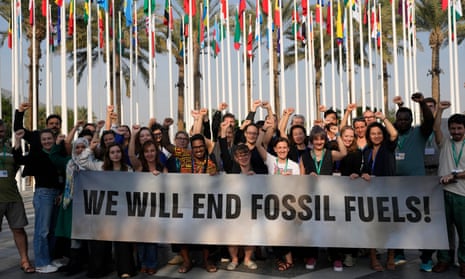Extract from The Guardian

Members of Greenpeace gather for a photo at the Cop28 summit in Dubai.
Climate change minister says deal is not perfect but ‘transition away’ from oil and gas sends clear message to investors.
Thu 14 Dec 2023 01.05 AEDT
Last modified on Thu 14 Dec 2023 06.26 AEDTNearly 200 countries agreed to a deal that for the first time called on all nations to transition away from fossil fuels to avert the worst effects of the climate crisis.
Speaking at the end of two weeks of intense negotiations in the United Arab Emirates, Bowen said the summit could have broken down after the release of a draft text that was rejected as “grossly insufficient” and a death sentence for low-lying and vulnerable countries, but the end result would be seen as significant.
“This is the first time that fossil fuels have ever been mentioned in a Cop decision. And that Cop decision is that we will transition away from fossil fuels. That is no small thing. It sends a signal to the world’s markets, investors and businesses that this is the direction of travel for countries right around the world,” he told reporters in Dubai.
“Of course, this decision is not what everybody would have written themselves as they got off the aeroplane. That’s true of the Pacific, as it’s true of Saudi Arabia, but there is a clear direction of travel. And for countries that are at the frontline of climate change, their voices are being heard, and as long as we have anything to do with it will continue to be heard.”
Despite the urging of 130 nations and scientists and civil society groups, the Cop28 agreement did not include an explicit commitment to phase out, or even phase down, fossil fuels due to resistance from countries including Saudi Arabia and the Opec group of oil producers.
Instead, it called on countries to contribute to global efforts to transition “away from fossil fuels in energy systems in a just, orderly and equitable manner, accelerating action in this critical decade, so as to achieve net zero by 2050 in keeping with the science”.
The final wording on fossil fuels echoed a Pacific Islands Forum agreement reached last month, and was raised by Bowen as a possible compromise during an intervention in a plenary session on Monday.
Countries from the global south and climate justice advocates said the text fell short of what was needed to help the most at risk survive worsening extreme weather and heat, and included language that appeared to placate fossil fuel interests.
Speaking as the chair of the umbrella group of countries – including major fossil fuel economies such as the US, Canada and Norway – in the final plenary, Bowen said: “The outcome does not go as far as many of us have asked for, starting with some of the most vulnerable countries, but the message it sends is clear – that all nations of the world have acknowledged the reality that our future is in clean energy, and the age of fossil fuels will end.”
Asked if there was a message in the agreement for Australia’s fossil fuel producers, he said: “Read the text. I think the text is very clear, the decision of the world is very clear here.
“Australia wants to be a renewable energy powerhouse, we want to create the energy for ourselves and for our region and for the world…The Cop decision today gives us a very good ecosystem…to develop that plan.”
Key points to come out of the deal included:
It reinforced the goal of limiting global heating to 1.5C, recognising it required a 43% emissions cut by 2030 and 60% by 2035 relative to 2019 levels. If adopted by Australia, that would translate to a 53% cut by 2030 and 67% cut by 2035 relative to 2005 levels.
Countries backed a call, already supported by Australia, for global renewable energy to be tripled and the rate of energy efficiency improvements doubled by 2030.
A statement that global emissions should peak by 2025 was dropped. China, among others, objected to this despite evidence it may be on track to peak its own emissions by then.
Language backed by fossil fuel interests found its way into the text, including “transitional fuels” – a code for natural gas – and “carbon capture and utilisation and storage”.
Little substantial progress was made on climate adaptation and finance, which the deal acknowledges will need trillions of dollars in support.
A loss and damage fund to help the most vulnerable repair the damage from climate breakdown was operationalised – considered a major step forward – but significant work remains to build its capacity.
The strained nature of the agreement, reached in the hottest year on record, reflects the UN consensus process. The commitments are not binding. Once a deal is reached, countries are responsible for delivering on the agreements through national policies and investments.
Climate Analytics’ chief executive Bill Hare said the agreement was a “mixed bag”.
“For the first time, the move away from fossil fuels is explicitly stated in a Cop outcome – a first nail in the coffin for the fossil fuel industry. Yet oil and gas producers squeezed in unhelpful language, pretending gas can be a transition fuel, or that carbon capture can clean up after them,” he said.
Tennant Reed, from the Australian Industry Group, said Australia played an influential role in strengthening the outcome on mitigation targets and the fossil fuel transition.
“Now we have to do some big homework and get ready for the positive and negative consequences of other nations’ transitions,” Reed said. “There’s big opportunity in that, but also some pain coming as and when demand for our coal and gas exports sag.”
Shiva Gounden, from Greenpeace Australia Pacific, said the final text made some progress, but did not go far enough to address climate destruction across the globe.
“If minister Bowen is serious in his commitment to our Pacific family, he must go beyond piecemeal announcements and address the elephant in the room – the expansion of the fossil fuel industry in Australia,” he said.
Richie Merzian, from the Smart Energy Council and a former Australian climate negotiator, said the global community had taken a clear direction towards renewable energy despite concerning parts of the text promoting “false solutions”. He said the result “finally names and shames the key culprits - fossil fuels”.
“The unintended focus on fossil fuels from the Cop presidency helped deliver an outcome that has eluded climate negotiators for the last 30 years,” Merzian said.
The Greens leader, Adam Bandt, called the deal a “weak word salad” and said it showed Australia could not wait for other countries before banning new coal and gas extraction.

No comments:
Post a Comment